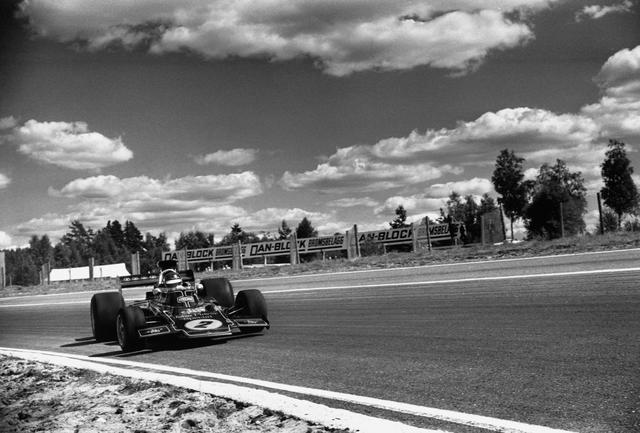Automoblog Book Garage: Lotus 72
Author Pete Lyons (Pete Lyons) records the story of the most legendary car in Formula One.
Lyons documents the incredible six seasons the Lotus 72 was in action (1970-75).
Our Book Garage series showcases what every enthusiast should add to their library.
Author
Pete Lyons
Publisher
Evro
ISBN
978-1910505335
Where To Get it:
Amazon
Lotus 72, published by Evro, and written by Pete Lyons covers one of the most important Grand Prix cars of all time and certainly one of the most important of its era. The book is large and thorough; and full of the kinds of photographs and technical details that make it a definitive record of the car.
Colin Chapman created more than a few revolutionary cars in his time, and more than a few revolutionary race cars too. His Lotus 72, more of an improvement on and a followup to his Lotus 49, could be seen as more of a baby step rather than a grand turn of the wheel. That is, until you look close.
Lotus 72: Diving Deep
Lyons Writes With Brutal Honesty
Obsessive To The Core
Lotus 72 Shows How Racing Evolved
Lotus 72 By Pete Lyons
About The Author
Lotus 72: Diving Deep
Looking closely is just what Pete Lyons does with Lotus 72. At first glance, it does not seem like a great leap forward (to quote Chairman Mao) but it actually is. The Lotus 72 set the design and engineering trends race teams are still following to this day: things like side-mounted radiators, integrated aerodynamics, and lighter unsprung mass.
It is with this car Chapman moved the benchmarks (again), and it is with this car some of the greatest racers of the era made their mark, most particularly Jochen Rindt and Emerson Fittipaldi. Indeed, Fittipaldi writes the forward for Mr. Lyons, flatly stating “The Lotus 72 was the best car I ever drove in my racing career.” Think about that for a second. Think about what other cars he raced and won with – cars from Penske for example – and you’ll realize what a declarative statement that really is.
We have no modern remembrances of what Rindt thought of the car, since he was killed at Monza in 1970. He is the only driver to ever be awarded the crown posthumously, and only drove the 72 in its early, more troubled stages.
1971 German Grand Prix, Nürburgring, Germany. July 30th – August 1st 1971. Emerson Fittipaldi, Lotus 72D Ford, at the Karussell. Ref: 71GER19. World Copyright: LAT Photographic. From Lotus 72 by Pete Lyons, published by Evro.
Lyons Writes With Brutal Honesty

All of this is unblinkingly covered by Lyons, a writer well suited for his subject. Although American by birth, he spent most of his career at points continental, covering the Grand Prix scene for the likes of Autosport Magazine. To date, he has written 14 books and won numerous awards. As ever, his writing here is sharp, incisive, and often funny. He makes no bones about the Lotus 72 being his favorite car and it shows on every page.
And why wouldn’t it? The 72 was the first Lotus to wear the now iconic black and gold John Player Special livery. Everything about the car, from the “flying doorstop” shape to its elegant aerodynamic layout, right on through to that classy yet sinister and intimidating paint scheme said, “You boys are just arguing over second place.”
The Lotus 72 didn’t start out winning though. It was a real bear to get it all sorted – perhaps there was too much cutting edge stuff throughout the car? Thankfully, Lyons doesn’t shy away from those harsh facts. Lotus 72 is not a book of beatification and hagiography. Lyons goes into a good amount of detail detailing the car’s teething troubles along with its development woes.
The podium (L to R): Colin Chapman (GBR) Lotus Team Owner; Marie-Helena Fittipaldi (BRA); Emerson Fittipaldi (BRA) Lotus winner; Francois Cevert (FRA) Tyrrell second. Spanish dignitaries in the back include Juan Antonio Sam
aranch, the provincial political head of Barcelona and member of the International Olympic Committee (IOC) and HRH King Juan Carlos of Spain. Spanish Grand Prix, Montjuich Park, April 29th 1973. From Lotus 72 by Pete Lyons, published by Evro.Obsessive To The Core
The Lotus 72 was a particularly long-lived car, considering race cars now, generally speaking, have lifespans measured in months. The 72 won more Grand Prix races and World Championships than any other single Lotus, and dominated the scene from 1970 until 1975. One of the reasons for its longevity was Colin Chapman’s relentless push to develop every part of the car. Perhaps the most revolutionary thing about the 72 (and a revolution that continues to this day at Louts) was the “keep pushing” mantra. And I mean really keep pushing.
Chapman got a bee in his bonnet with the 72, constantly tweaking every system, sub-system, component, chassis geometry, aerodynamics, cooling, braking, everything, everything, everything. Luckily, for him and his drivers, the 72 was a solid platform from day one and took these refinements and improvements the way most of us take a pay raise. Sadly, if you were not driving a 72, your days were pretty dismal, always arguing over second place on back, living off the scraps Team Lotus decided not to wolf down.
1970 British Grand Prix, Brands Hatch, England. July 16th – 18th 1970. Jochen Rindt (Lotus 72C-Ford) in 1st position. Ref: 70 GB 64. World Copyright: LAT Photographic. From Lotus 72 by Pete Lyons, published by Evro.
Lotus 72 Shows How Racing Evolved
Lotus 72 also documents the final days of the devil-may-care era of Grand Prix racing. This was the car Jackie Stewart raced against, and it was Stewart, first and foremost, that took on the flippant attitude towards “safety” at the time and made it into what we have today.
It’s not golf, but racing today is much, much safer than it was when the Lotus 72 was first drawn up. Look no further than the shot on the bottom of page 38 (and directly above). There’s “Black” Jack Brabham in one of his own cars, hot on the heels of Rindt in his Lotus 72 at Brands Hatch in England. And there, maybe three feet away from the cars is an unnamed press photographer, dropped on one knee, getting what has to be a magnificent shot. In the background, hundreds of spectators are separated from the track by only a berm and less than a hundred feet of air.
Where we are today is due in large part to what the Lotus 72 set in motion in 1970, and every mile is covered in great and very entertaining detail by Mr. Lyons. This book is not just highly recommended, it is a requirement for any racing fan and their collection.
Tony Borroz has spent his entire life racing antique and sports cars. He is the author of Bricks & Bones: The Endearing Legacy and Nitty-Gritty Phenomenon of The Indy 500, available in paperback or Kindle format. Follow his work on Twitter: @TonyBorroz.
Lotus 72 By Pete Lyons
Series: Formula 1 Greats
Hardcover: 304 pages
Publisher: Evro Publishing Limited (September 24th, 2019)
Language: English
ISBN-10: 1910505331
ISBN-13: 978-1910505335
Product Dimensions: 9.6 x 1.1 x 11.4 inches
Shipping Weight: 4.2 lbs.
Where To Buy: Amazon
About The Author
Pete Lyons is an international motorsport journalist, photographer and award-winning book author. Formula racing, Can-Am, endurance sports car, Indycar, Trans-Am and more forms of sports. In his decades-long global career, Lyon has authored 14 books and is also a staff member and/or freelance writer for stories and/or pictures in numerous fan publications, including Motorsport, "Car Weekly", "Cars and Drivers", "Roads and Cars", etc. Race tracks, retro motorsports and more. His honors include two Dean Batchelor Awards for Excellence in Journalism and a Lifetime Achievement Award.
-
Latest
 The latest bull market: Lamborghini Aventador LP-700-4
The latest bull market: Lamborghini Aventador LP-700-4Lamborghini Murcielago set off like a lion (or more precisely, a bull), retiring after 9 years of operation at the top of the supercar’s prestige ladder. Reaching a peak horsepower of 661 horsepower (...
-
Next
 What does the modern warranty really cover?
What does the modern warranty really cover?Modern factory warranty is one of the best on the market.See why you could still benefit from an extended warranty.You’ve purchased a new Hyundai, and the dealer says you’re getting “America’s Best Wa...
